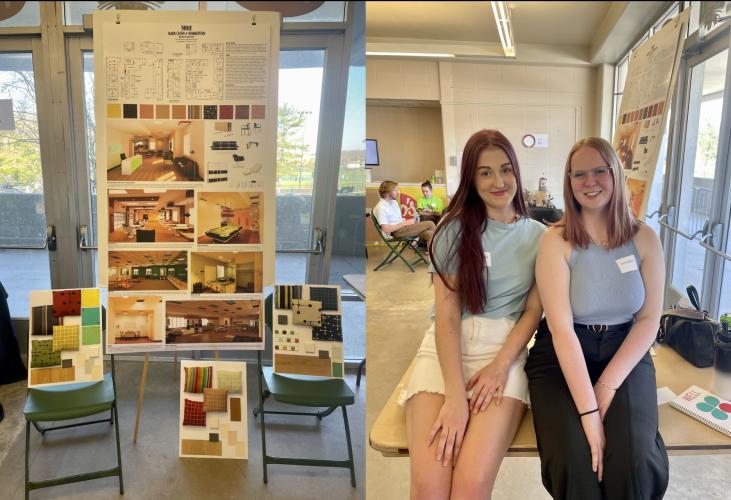
Interior architecture student leverages evidence-based design to improve short-term care facility concepts

When it comes to art, one might envision beautiful drawings or paintings. For Ohio University senior Emma Grubb, art takes on the form of interior design.
“We call it an art and a science, you can't have one without the other,” she explains, “form and function are equally important.”
Grubb grew up in Cincinnati, and then began her undergraduate studies at Baylor before transferring to Ohio University.
“I kind of always knew I was going to do design,” she says, “I always thought buildings, spaces and their color theories were cool, I just didn’t realize the word for it was architecture until I got older.”
Over the last two semesters Grubb’s time and energy has been spent constructing her research project, designing a senior center.
“Last semester was all focused on the research part of the project, which we call evidence-based design," Grubb says. "I think that is important to point out because a lot of people don’t realize that design is based off of real things, not just your taste.”
Grubb explains that normally their projects are much more structured, they are given a client and told to design a building that fits his or her needs. With this project the students were given greater leeway.
“This projected gave us the most freedom we’ve ever had, we had to choose a social issue or problem to solve and then design based around that," Grubb explains.
“I wanted to do a short-term [care] center because those places are often super run down as they are only meant for quick stays,” she says. “My grandma had to go through that when she got injured, so that’s why I chose that topic.”
“I put more focus on the space being accessible because that's one of the bigger things when you're designing for older people,” Grubb explains. “You need wider passageways, so that they can do things like turn around if they happen to be in wheelchairs.”
There were bare minimum specifications Grubb had to complete related to accessibility standards, which she explained were called universal designs, but each student had their own challenges to overcome depending on the issue they chose.
“Universal designs make everything easily accessible but are mostly hidden so people don’t feel isolated due to their disabilities. This was definitely difficult to accomplish for a nursing home because there are a lot of accessibility features,” Grubb continues.
She explains that in order to achieve this universal design she hid certain objects in plain sight. For example, she designed the furniture to be mounted in place and act as a stabilizing elements in case residents lose their balance.
While the architecture of Grubb’s space is important, the artistic value of interior design cannot be overlooked either.
“It’s important that it doesn’t look like a hospital, you don't want everything to just be blue, clinical and bland,” she says, “but it also has to be functional, so I ended up using bright color palettes.”
During the research phase of her project, Grubb learned that low contrast colors have a higher chance of confusing senior citizens so instead she used colors with increased contrast.
“If I used low contrast colors they may get visually confused at where the wall ends and the floor begins, so I have to make those differences obvious through color schemes,” she says.
Grubb, like all interior architecture students, is expected to complete her major thesis design project as a key part of degree completion in the School of Art + Design.
Recently, Grubb presented her senior center at this year’s Student Research and Creative Activity Expo with an accompanying 10-minute presentation, in which she walked people through her design process and thinking.
She concludes, “I’ve been preparing for this presentation so long I feel like I could talk about this stuff in my sleep.”
